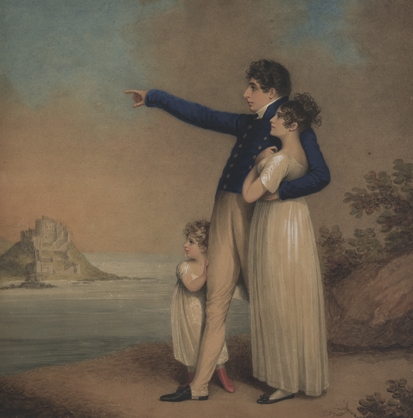The last time the general reader was inveigled into the domestic intensities of the Wordsworth circle was by Frances Wilson in The Ballad of Dorothy Wordsworth. She engaged delicately with Dorothy’s inordinate love for her younger brother William, and seemed to think her passionate attachment was romantic and sentimental rather than sexual — though there are 50 shades of grey between the one and the other, and honestly, it doesn’t matter.
Katie Waldegrave, in her riveting family saga The Poets’ Daughters, is not much concerned with that anyway. Her focus is on what happened to Wordsworth’s daughter Dora, the second of his five children, and Coleridge’s youngest, Sara. There were 20 months between them and they were much together as children. Coleridge’s discarded wife dressed Sara in frilly frocks, while Wordsworth believed in children being ‘wild and free’, dressing Dora in sleeveless smocks, preferably Prussian blue. He would have loved denim — though that is just the kind of comment Waldegrave does not make, being scrupulous about not imposing 21st-century perceptions and attitudes on her narrative.
Anyone coming to the story of the domestic life and emotional ramifications of the Lake Poets for the first time, however, may reflect that nowadays these intertwined families, enmeshed in a spider’s web of relationships ‘built on love and envy, rivalry and fierce loyalty’, might have had social services breathing down their necks.
Wordsworth and Coleridge, the two great poets of their day, were close friends, collaborators and quarrelers. Wordsworth was tall, tanned and fit. Coleridge, who believed his friend was the most important English poet since Milton, was short, fat and puffy-faced, addicted to opium — but then so were they all, just about, whether young or old, male or female. Children were added and subtracted between households, cared for by assorted aunts as well as parents. Coleridge’s sister was married to Robert Southey, the most responsible of the group, in whose house Mrs Coleridge, Sara and her surviving brother perched off and on for years, with Sara acting as tutor to the Southey children as she grew older.
Coleridge, according to Southey, was ‘murderous of all domestic instincts’. When not abroad he stayed for long periods not with his own children but nearby with the Wordsworths in their first cramped, cold cottage, where they were subsisting on toast and porridge. He was the guest from hell, and infatuated with Mrs Wordsworth’s sister who, like the poet’s own adoring sister, was crammed into the tiny cottage along with the growing family. Coleridge made a pet of Dora, and proved a sadly elusive father to Sara. Another habitué of the Wordsworth ménage was Thomas de Quincey, who doted on one of Dora’s little sisters, carrying her away to sleep with him in his bed in his own cottage.
When they were adolescent, Dora was ‘almost twice as bulky’ as Sara, a big strapping girl and very pretty. She may have been ‘wild and free’ as a child, but as a young woman she became the amanuensis of her famous father, enslaved by her love for him and his dependence on her, pattering after him on his walks with a notebook, like her Aunt Dorothy, to preserve his poetic mutterings. The strapping girl became an emaciated, hunched young woman. She starved herself.
Eating disorders were rife in the group, as were the side effects of opium consumption, chiefly chronic constipation. Bowel events were shared without embarrassment. Sara, who grew up to be earnest and scholarly, and translated works from the Latin, became opium-dependent. Much importance was given to the health-giving effect of regular menstruation. The young women took emmenagogues — a word new to me — which are herbal preparations to stimulate the blood flow.
Sara married a cousin and had children. But any attempt by a suitor to prise Dora from her father’s side resulted in shock-horror from him and weeks of illness and self-starvation for her. The poet Edward Quillinan, a disciple and assistant of Wordsworth’s, courted her for more than a decade and finally won her. They went to Portugal, and she wrote a spirited account of that country and of their adventures on the trip which was totally made up — she was ill in bed most of the time. She was outlived by both her husband and her famous father. Sara Coleridge found fulfillment in her later years by restoring her own brilliant father’s reputation and editing his prose works, most famously his Biographica Literaria, thus reclaiming him and caring for him as he had never done for her.
Those who wring their hands nowadays about the ‘breakdown of the family’ are maybe begging the question. Families have always morphed and mingled, especially among the very poor, the very rich and the artistic. Anyway, anorexia, addiction and abuse can happen even in so-called traditional nuclear families. Katie Waldegrave is non-judgmental. This is her first book, and she has negotiated the mountains of material and the emotional swamps with skill and clarity.






Comments